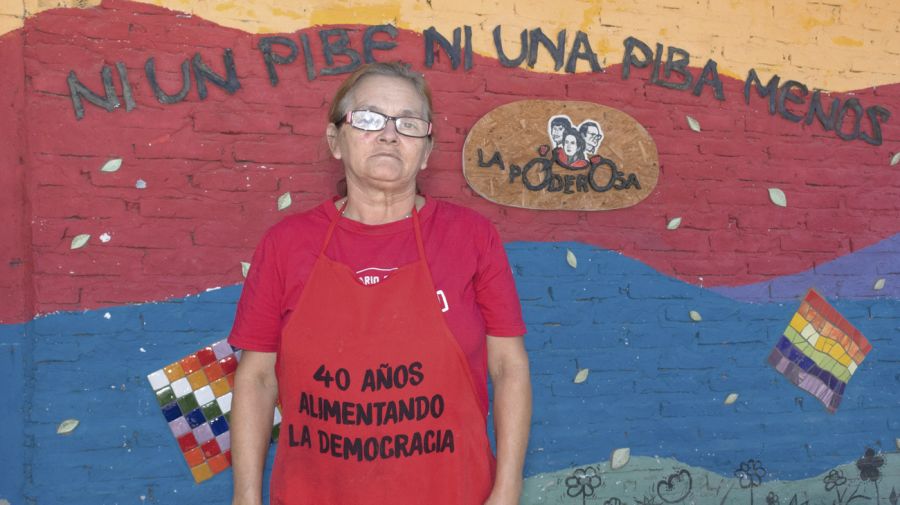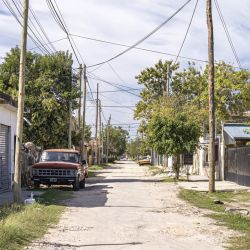Eudelia stirs a large metal pot with energy. The aroma of the chicken and rice stew she is concocting has already permeated the entire room of La Poderosa, a social organisation, and is travelling the corridors of La Fátima, a marginalised barrio on the edge of Buenos Aires City. The cook has been making lunches and snacks for more than a decade. She says that, although things have been difficult for years, she has noticed changes in the last few months.
"More retirees and children started to come, even people who have jobs," he says, pointing with her eyes to the line of people waiting outside.
The story repeats itself in every corner of Argentina. The nation is mired in an almost unprecedented crisis. Economic stagnation, coupled with record annual inflation of more than 270 per cent, has led to a rising poverty rate, which is projected at almost 60 percent, according to a study by the Catholic University of Argentina, the highest it has recorded in 20 years. UNICEF warns that if the government does not increase social spending, child poverty could reach 70 percent before the end of the year.
The UN agency’s call for greater social protection relates to the economic shock plan put in place by President Javier Milei, who took office in December. So far, the libertarian leader has introduced a sharp devaluation of the local currency and an abrupt cut in public spending, which includes support for the soup kitchens on which millions of people depend.
Milei says this is the only way to get the country back on track. And that it is working. Fiscal accounts have shown a positive balance for the first time since 2012 and inflation dropped in February. The President is now promising more cuts. "It won't be long now," he predicts, asking for patience.
Fears
In marginalised neighbourhoods across Argentina, the impact of the crisis runs deep, to the dining tables and the nameless corridors. There is fear for what is to come.
Fernanda Miño, a social leader from La Cava, an informal neighbourhood in the northern part of Greater Buenos Aires, says she is concerned about the impact of the crisis on young people.
Until the end of 2023, Fernanda was in charge of a social programme for the urbanisation of marginalised areas. The programme was notable in that it encouraged the participation of the local community in decision making and employed local labour. It was a win-win situation. But Milei’s “chainsaw " cut the budget that had been allocated to it.
"We used to give work to the local kids. Now, what are they going to do? I'm afraid of what will happen when the cooperative is no longer there to contain them, when the state is no longer there," she says, explaining that the lack of integration programmes is tantamount to opening the doors wide to criminal gangs seeking to control territories.
The equation is relatively simple, and frightening. With a broken economy, fewer opportunities in the formal economy, more poverty and marginalisation, the appeal of what criminal groups offer grows: making money, a sense of belonging, local power.
Monica Troncoco, from La Poderosa, the organisation that runs the soup kitchen in Fátima, says that they are starting to see what in other neighbourhoods in the area was happening 20 years ago. Places are now “completely taken over by narcos,” she says.
"I feel that we are moving towards that. Now we see that there is more drug consumption and if there is more demand and more people who want to consume, the drug-dealers are not going to take long to arrive, to look for a way in. All of that is related to the crisis.”
Similar kinds of stories can be heard at every corner of Greater Buenos Aires.
"Drugs have been expanding over the last 10 years, under different governments. They have penetrated the social fabric and [are] massively changing the way people interact with each other," explained one leader from San Martín, in the Greater Buenos Aires area, who asked not to be named for safety reasons.
"In the neighbourhoods there is a lot of cocaine, cocaine paste and other types of much more destructive drug use that creates zombies. What kind of relationship can you build with children who are like zombies? In this context, what we see is young people thinking that if you don’t have enough to eat you may as well get high to avoid thinking,” they explained.
In addition, there are those who identify who the most vulnerable young people within the neighbourhoods are, those who care for their loved ones or who have just come out of school – those who are less likely to say "no" to being recruited as cheap labour. "Little soldiers" as they are commonly called.
"The lack of work is a fundamental issue, the lack of opportunities. There are many young people who are completely alone. People who live on dirt floors and without electricity. What are all these teenagers going to do? The kids who come out of prison and return to these contexts, what are they going to do? In the urgency of bringing money home, they go there to sell drugs. They don't see anything else," the leader explained.

Dynamics
Analysts say that beyond worsening social conditions, the economic crisis may change the criminal dynamics of the cocaine market in the mid and long run.
Firstly, they explain that the devaluation of the local currency against the US dollar can have an impact on the dynamics of the cocaine trade. As the drug is not produced in Argentina, local groups need to get hold of more pesos to buy the product in dollars, which is increasingly complex, explains Hernán Flom, a political scientist who researches organised crime, violence, and policing.
"If you extrapolate that to other stages of the process, you could see those organisations either buying less or increasing a way of supplementing their daily income by taking on other illicit activities such as car theft or trade in other kinds of materials, weapons or whatever, to pay these groups, or find other partners for the business," Flom explained.
Secondly, even though the illicit drug market has greater elasticity in terms of supply and demand, a severe economic crisis can affect this and generate changes in consumer markets.
"Like in any business, the retailer knows that there is a limit to the price they can charge. The dilemma is whether to raise the price, lower the quality, or both," said Flom.
"There is always a large segmentation of the market, with consumers with greater purchasing power who will continue to go for a higher quality product and probably have more flexibility in terms of what they can afford, and the market with less purchasing power that consumes more stretched or lower quality drugs or some kind of substitute, which is worrying in the sense of more home-made, more domestic production with cutting substances and the rise of synthetic drugs,” detailed the expert.
Argentina is one of the largest cocaine consumption markets in Latin America and the market has increased in recent years, according to UN data.
Third, local changes in the context of the ongoing crisis create an environment that facilitates money-laundering.
"On the one hand, you have a country with a low number of convictions for money-laundering, and on top of that you have a government that wants to deregulate all areas of economic life, which makes it easier for dollars to enter that can be laundered along with other products that can enter materially through the financial system," Flom explains, arguing that at a time of acute economic crisis and high recession, with investment needs, controls can become laxer.
Finally, combating complex crime organisations requires investment and time, facts which seem to contradict the Milei administration’s view of the role of the state.
Meanwhile, in Zabaleta, one of the largest working-class neighbourhoods in the nation’s capital, social leaders say that the problem is not being able to compete with what the narcos offer young people.
"The deeper the crisis, the deeper the hunger, the more viable the alternative of micro-trafficking as a way of life to earn easy money becomes. Even if you end up dead or in prison.
“We do prevention work, we are there for the kids, we open community spaces, but it is very difficult to compete with the other options. I said to one boy 'You're going to die if you go on like this.' He looked at me and said: 'I'm already dead.'"
*Josefina Salomon an independent journalist. She is the co-founder and Editorial Director of In.Visibles, a new outlet that analyses the dynamics of criminal organisations, illegal markets and their impact on marginalised populations across Latin America. For more, visit https://invisibles.info/en/
**This article was syndicated with kind permission from the publishers.






























Comments